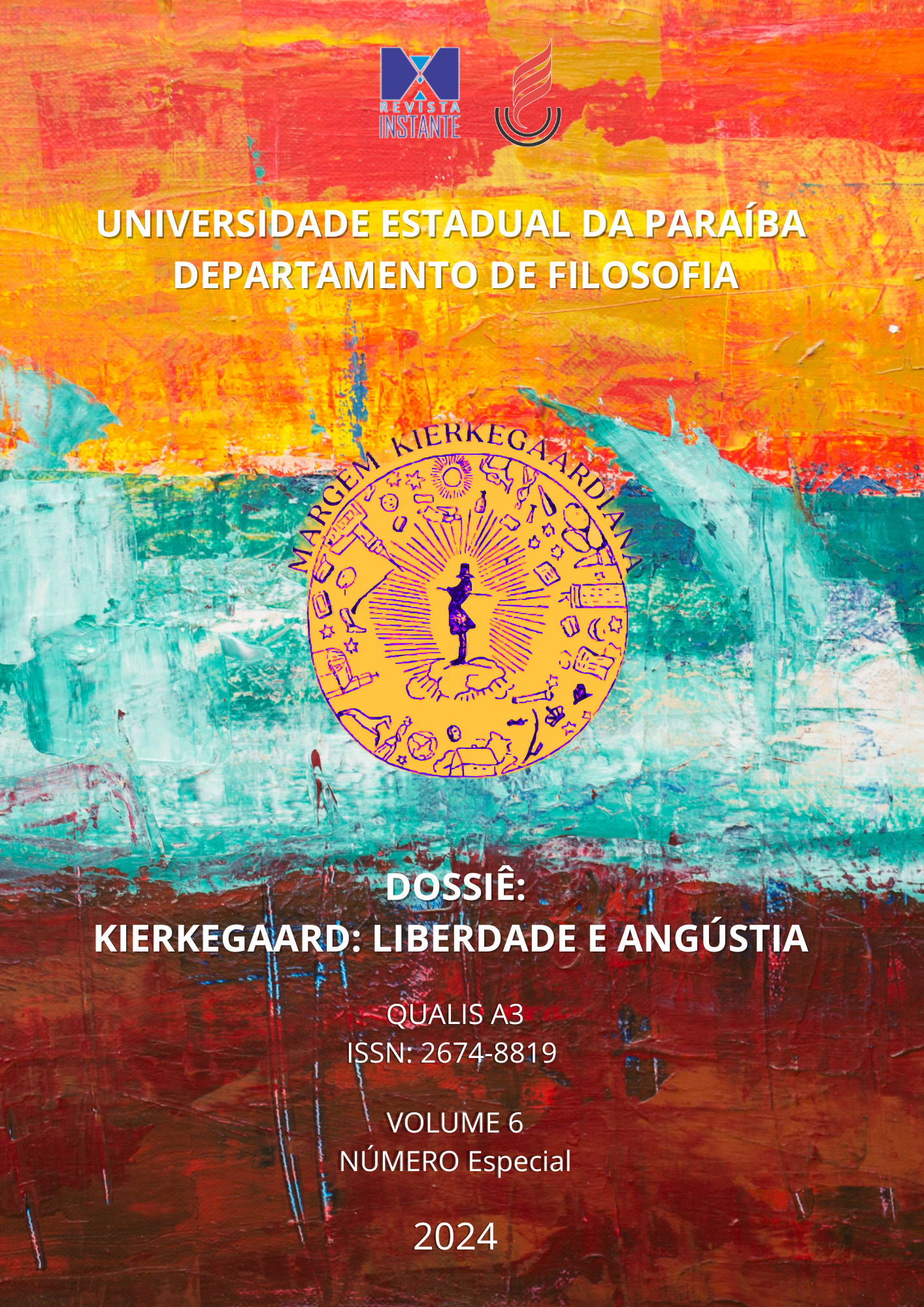ABOUT THE MADDENED REPENTANCE
Keywords:
Kierkegaard. Faith. Ideal Possibillity. Anguish. Mortal Anguish.Abstract
: In this paper which aims to edify those who approach, we will submerge into the paralyzing and illusory form of the repentance present in The Concept of Anxiety, by Kierkegaard: the maddened repentance. This repentance consists of our vain and decadent habit of fighting against life by supposing that it should and could be different from what it was. Ana Prado ilustrate by saying that, in her garden she planted an if seed, but it never grew. Such repentance – one that does not turns into the individual´s freedom, not being able to annul sin, but only mourn for it – is not capable of overcoming the mortal moment of the Anguish, making residence in this state. Through the development it will become clear that habit comes from not letting ourselves be formed in anguish by faith. But what is the faith? Usually the horde refers to faith as a conviction that things in the life will turn out as desired. However, in this work, the faith will trought of as an existential outlook, that in human humus, is in tune with the reality itself. In this faith – transcendent way from desperate to the forgiveness (crossing of giving) – we have the surrender of an existence addicted to plant seeds that don´t grow. In other words, abandoning the regretful interpretation towards the past and present, as well as relinquishing the fear of the future, we can leap into a re-existence that decides welcome existence unconditionally (and with pleasure). Here, then, we will traverse this path of the individual from the maddned repentance to metanoia (true repentance).
References
ABBAGNANO, Nicola. Dicionário de filosofia. 5º ed. Trad.: Alfredo Bossi. São Paulo: Martins Fontes, 2007.
BÍBLIA DE JERUSALÉM: Tradução do texto em língua portuguesa diretamente dos originais. Tradução das introduções e notas de La Bible de Jérusalem, edição de 1998, publicada sob a direção da “École biblique de Jérusalem.” Edição em língua francesa / Les Éditions Du Cerf, Paris, 1998, ed. revisada e ampliada. 1°edição, 2013 / 5° reimpressão, 2022.
BUBER, Martin. O Caminho do homem segundo o ensinamento chassídico. É Realizações: São Paulo SP, 2011.
HARADA, Hermógenes. Verdade e Liberdade / Seminário: Da essência da verdade. Martin Heidegger. 2°semestre de 1970.
HESSE, Hermann. Sidarta. Trad.: Herbert Caro. 16º ed. Rio de Janeiro: Editora Civilização Brasileira, 1975.
KIERKEGAARD, Soren. A doença para morte. Trad.: Jonas Roos. Petrópolis, RJ: Vozes, 2022.
__________. As Obras do Amor. 4º ed. Trad.: Álvaro Luiz Montenegro Valls. Petrópolis, RJ: Vozes, 2013a (Coleção Pensamento Humano).
__________. Ou – Ou: Um Fragmento de Vida (Primeira Parte). Trad.: Elisabete M. de Sousa. Relógio D` Água Editores, 2013b.
__________. Adquirir a sua Alma na Paciência, dos quatro discursos edificantes. Trad: LISBOA, N. Ferro e M. Jorge de Carvalho. Edição 1094: 2007.
__________. O conceito de angústia: uma simples reflexão psicológico-demonstrativa direcionada ao problema dogmático do pecado hereditário. Trad.: Álvaro Luiz Montenegro Valls. 3º ed. Petrópolis, RJ: Vozes, 2015.
__________. Discursos edificantes em diversos espíritos – 1847. Trad.: Álvaro L. M. Valls e Else Hagelund. São Paulo: LiberArs, 2018.
LISPECTOR, Clarice. EDITORA DO AUTOR - Av. Nilo Peçanha, 155 - Gr. 207 - “EDAUTOR” - Rio de Janeiro. Copyright by Clarice Lispector. Rio, 1964.
PESSOA, Fernando. 1888-1935. Poemas Completos de Alberto Caeiro / Fernando Pessoa; [organização Carlos Felipe Moisés]. 2º ed. São Paulo: Ática, 2013.
NIETZSCHE, Friedrich Wilhem, 1844- 1900. A gaia ciência. Trad.: Paulo César de Souza. São Paulo: Companhia das Letras, 2012.
__________. Genealogia da Moral, Uma polêmica. Trad.: Paulo César de Souza. São Paulo: Companhia das Letras, 2009.
__________. Ecce homo: como se chega a ser o que se é / Braga. São Paulo: Lafonte, 2021.
PRADO, Ana Maria Ferreira, (s.d.), Comunicação Pessoal.










